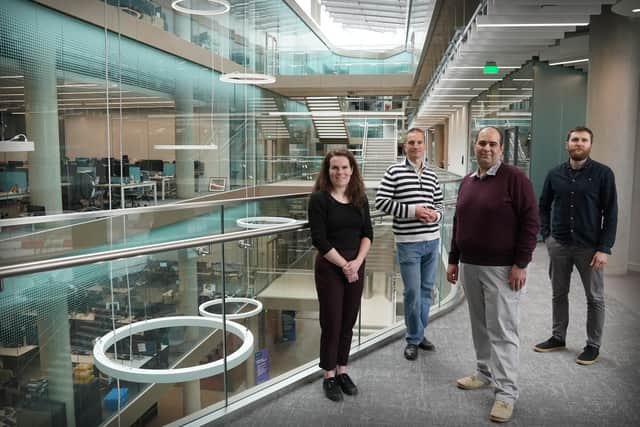Respiratory-focused University of Glasgow spin-out secures £1m boost
Acu-Flow has secured the cash injection from Innovate UK as one of 17 projects funded by the UK's national innovation agency’s Biomedical Catalyst programme, which provides funding for new healthcare products, technologies, and processes.
The firm said the sum will help advance the development of its nebuliser technology known as Nebu~Flow that uses an “innovative” surface acoustic wave technique to deliver medicines into patients’ lungs.
Advertisement
Hide AdAdvertisement
Hide AdIt added that its offering provides key advantages over existing technologies that are “limited in their ability to nebulise different types of formulation”, with patients potentially as a result having to use their nebuliser more than is comfortable, for up to 20 minutes and as many as six times per day.
Nebu~Flow is described as producing droplets from formulations within the clinical proven optimum range, capable of reaching patients’ lungs and maximising the treatment’s effectiveness, reducing the time required to deliver a dose, added the firm – which expects to use its nebuliser platform to deliver new nanomedicines and vaccines, including biologics, to patients.
Acu-Flow – which signed up to Filament STAC’s Internet of Things (IoT) accelerator – added that over the next two years, and supported by the University of Glasgow and the NIHR Devices for Dignity Med-tech Co-operative, will work to develop a fully-integrated nebuliser, ready to take to large-scale manufacture.
Dr Elijah Nazarzadeh, Acu-Flow’s chief executive and a co-founder, said: “We’re delighted to have been awarded this significant grant from Innovate UK, which will allow us to accelerate our research and development over the next two years, helping us to bring our innovative and potentially life-changing technology to market.


“Respiratory diseases are the world’s leading causes of disability and death. Collectively, they add a huge burden to global health services. The Covid-19 pandemic has made us all aware of respiratory disease and the importance of new treatments to alleviate their effects.”
“While treatments for some of these diseases have advanced significantly in recent years, there are still significant challenges to overcome the efficient delivery of drugs directly to patients’ lungs.
Life-changing
"Our new technology will not only improve the amount of drug reaching the lung, but will enable new drug formulations, helping pharmaceutical companies to develop the next generation of life-changing treatments.”
Professor Jonathan Cooper of the University of Glasgow’s James Watt School of Engineering, a co-founder of the company, cheered the spin-out’s acceleration, “enabling their products to better deliver inhaled drugs”.
Advertisement
Hide AdAdvertisement
Hide AdHe added: “In addition to the benefits for patients, Acu-Flow’s methods also greatly reduce the associated carbon footprint with respiratory disorders, helping contribute to sustainability targets within healthcare, as we all strive to meet net zero”.
As part of the project, NIHR Devices for Dignity will collect data to demonstrate the effectiveness of the nebuliser and ensure the designs are fit for purpose.
Professor Wendy Tindale, NIHR Devices for Dignity's clinical director, said: “We believe that Acu-Flow’s technology has the potential to deliver a user-friendly nebuliser, enhancing the patient’s adherence to medication, and we will work with the team to ensure that voice of patients is heard and integrated into the designs, as a co-creation effort”.
Comments
Want to join the conversation? Please or to comment on this article.
